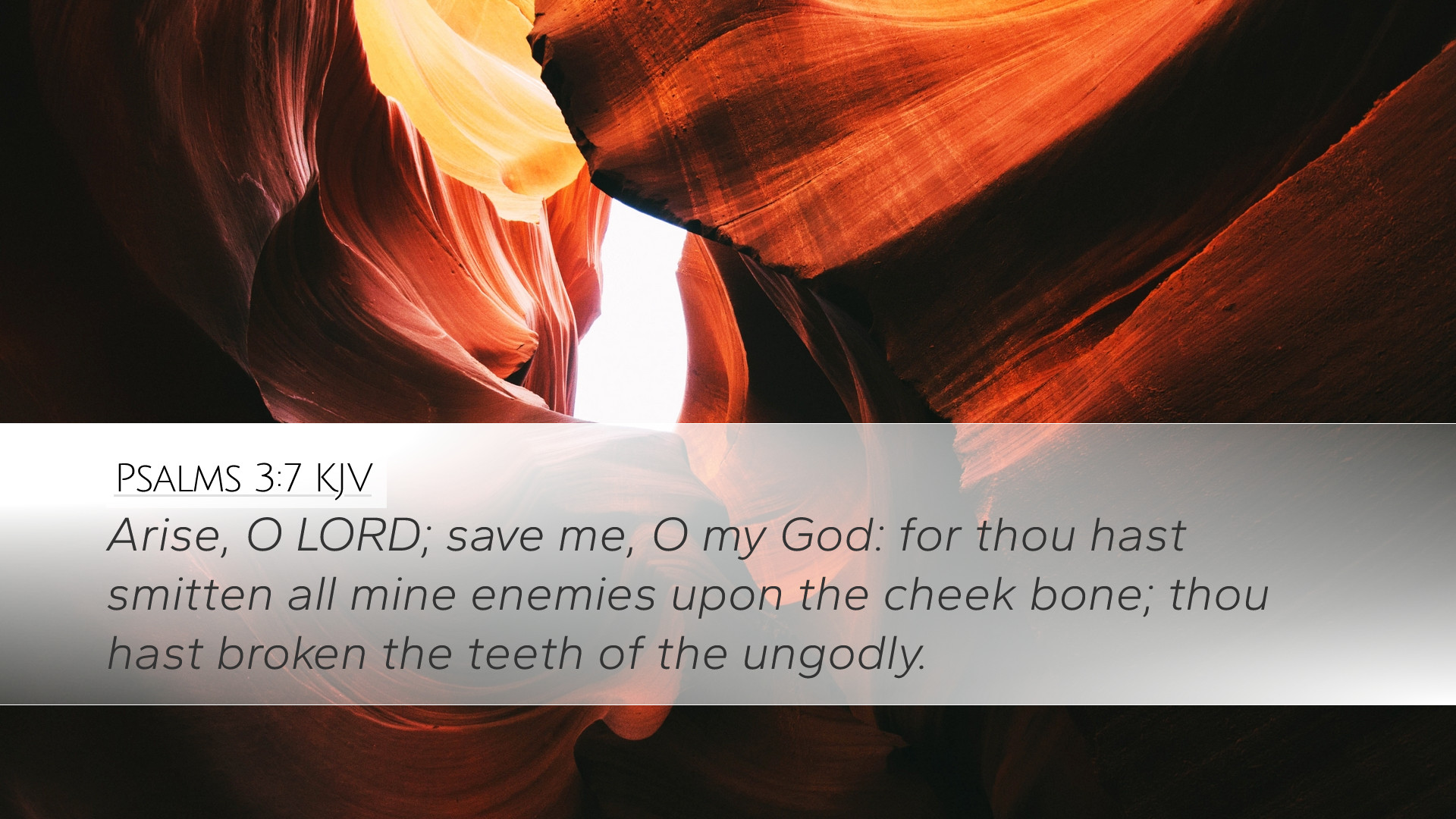Psalms 3:7 - A Commentary
Verse: "Arise, O Lord; save me, O my God: for thou hast smitten all mine enemies upon the cheek bone; thou hast broken the teeth of the ungodly."
Introduction
This verse, a heartfelt plea from David amidst turmoil, captures the essence of divine intervention and the assurance of God's power over adversaries. It reflects a profound trust in God's ability to deliver and provide solace in times of distress. The intricacies of this petition reveal layers of theological significance and practical implications for believers facing adversities.
Context and Authorship
The psalm is attributed to David, likely composed while fleeing from Absalom, his son who sought to usurp the throne. Understanding the context enhances the verse’s emotional weight; it was born out of physical danger and familial betrayal. David’s composition of the psalm during this tumultuous period demonstrates his reliance on God as his ultimate source of security and strength.
Exegesis of Key Phrases
"Arise, O Lord;"
David invokes God to "arise," which signifies an appeal for the Lord's active presence. This cry is reminiscent of other biblical pleas (e.g., Psalms 44:23) where the psalmist recognizes God's omnipresence yet yearns for a tangible manifestation of His aid. This phrase encapsulates the urgency and fervor in David's request for deliverance.
"Save me, O my God:"
This request for salvation underscores David’s recognition of God’s sovereignty and capability to deliver. The term "my God" signifies a personal relationship, marking the psalmist not merely as a subject but as a beloved child reliant on the Father's protection. Albert Barnes notes that this reflects both a cry for help and an affirmation of faith in God’s saving grace.
"for thou hast smitten all mine enemies upon the cheek bone;"
The imagery of smiting enemies upon the cheek conveys a vivid depiction of humiliation and defeat. Adam Clarke interprets this as an expression of God’s judgment against the proud and wicked who oppose His chosen ones. This vivid metaphor serves to remind the faithful of God’s past victories and reassures them of His continuing justice.
"thou hast broken the teeth of the ungodly."
The breaking of teeth signifies rendering the adversary powerless; teeth symbolize strength and the ability to cause harm. Matthew Henry notes that this imagery demonstrates God’s capability to neutralize threats and instill fear within the unrighteous. For believers, it reassures that God has the ultimate authority over all wickedness, rendering their plans ineffectual.
Theological Insights
-
Divine Intervention: The psalmist's cry illustrates the belief in God’s active role in the lives of His people. It prompts believers to seek God earnestly in trouble, trusting in His ability to intervene and save.
-
Personal Relationship with God: David’s intimate address to God as “my God” is an essential element that emphasizes the covenantal relationship between the believer and the Creator, encouraging readers to cultivate a similar personal connection.
-
God's Judgment: The verse serves as a reminder of God’s justice. He protects His people and punishes the wicked, instilling hope in the faithful that God will ultimately vindicate them.
-
Faith and Assurance: David’s confidence in God’s past actions provides a model for believers facing difficulties, encouraging them to recall God’s faithfulness in their own lives as they cry out in prayer.
Practical Applications
For pastors, this psalm serves as a compelling encouragement to lead their congregations in seeking God’s deliverance, teaching the importance of persistent prayer in the face of adversity. For students and scholars, a deeper study of this verse can unravel themes of trust, divine sovereignty, and the human condition in relation to God’s providence. The emotional gravity of David’s expression should evoke a sense of urgency in prayer, compelling believers to approach God with honesty and fervor in their struggles.
Conclusion
Psalms 3:7 encapsulates profound truths about God’s nature and the believer’s dependence on Him. David's plea is both an expression of desperation and a profound confidence in God's saving power. As believers reflect on this verse, let it inspire trust and a desire for a deeper relationship with God, encouraging them to call upon Him with the assurance that He hears and responds to the cries of His faithful.


